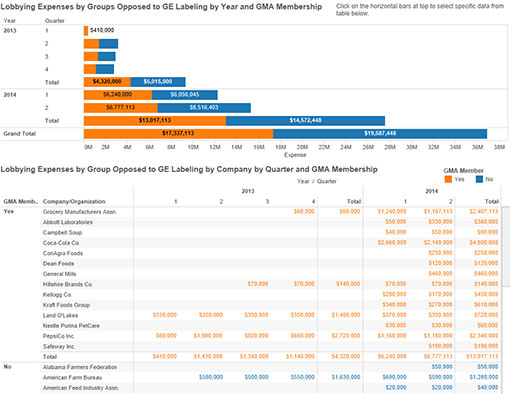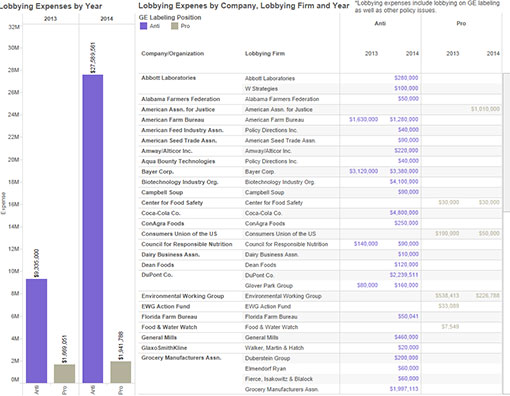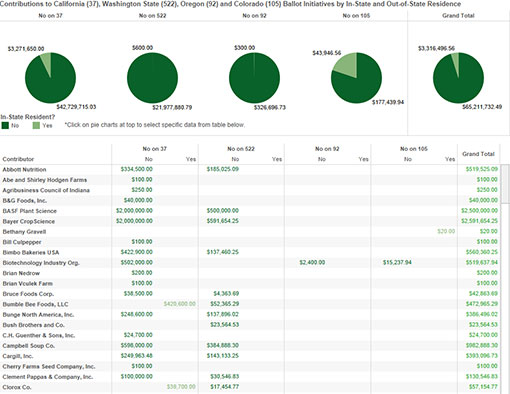
Companies and organizations opposed to labeling foods that contain genetically engineered ingredients disclosed $15.2 million in lobbying expenditures that made reference to GE labeling in the second quarter of 2014, according to analysis updating a July EWG report. When combined with lobbying expenditures from the first quarter of 2014, these companies have disclosed $27.5 million in the first half of 2014 that made reference to GE labeling– nearly three times as much as they disclosed in all of 2013.
The burst of lobbying by food and biotechnology companies was partly designed to muster Congressional support for legislation that would block states from requiring GE labeling on food packages. That bill, dubbed the Deny Americans the Right to Know (DARK) Act by advocates of GE labeling, was introduced on April 9 by Rep. Mike Pompeo (R-Kan.).
In May, Vermont became the first state to enact legislation to require GE labeling, although industry has filed suit in an effort to block it. Connecticut and Maine have passed GE labeling laws that would go into effect if other northeastern states pass similar legislation.
Oregon and Colorado voters will consider GE labeling ballot initiatives this fall, and labeling bills have been introduced in 30 other states in 2013 and 2014.
Food and biotechnology companies and organizations disclosed $9.3 million in lobbying expenditures in 2013 that made reference to GE labeling and $27.5 million in the first two quarters of 2014 alone. The forms cite lobbying on GE labeling as well as other policy issues.
EWG updated our July analysis of first quarter lobbying expenditures.
In particular, the Grocery Manufacturers Association disclosed $2.4 million in lobbying expenditures that made reference to GE labeling in the first two quarters of 2014. The Association’s member organizations separately disclosed another $10.6 million in lobbying expenditures that made reference to GE labeling in the first two quarters, including $7.1 million by beverage giants Coca-Cola and Pepsi.
Food industry lobbying in Congress dwarfed that of supporters of GE labeling, who disclosed $1.6 million in lobbying expenditures that made reference to GE labeling in 2013 and $1.9 million in the first two quarters of this year – almost one-tenth as much as the opponents. Advocates of GE labeling are supporting legislation introduced by Rep. Peter DeFazio (D-Ore.) and Sen. Barbara Boxer (D-Calif.) that would require GE labeling nationwide.
Several companies that produce genetically engineered seeds and herbicides – including Monsanto, Syngenta and Dow AgroSciences – did not report lobbying specifically on either piece of legislation on their 2013 disclosure forms or in the first quarter of 2014. Instead, their reports cited general advocacy on “biotechnology and biotech product issues,” “biotech innovation and regulation” and “biotechnology acceptance.” But, Monsanto did disclose lobbying expenditures that made specific reference to the DARK Act in the second quarter of 2014.
The DARK Act would block any state from requiring GE labels on packaged foods. In addition, it would also limit the Food and Drug Administration’s ability to mandate GE labeling nationally.
Instead, the DARK Act would codify existing FDA rules that permit voluntary GE and non-GE labels. To date, no food manufacturer has voluntarily disclosed the presence of GE ingredients in its products.
Americans overwhelmingly support the right to know whether there are genetically engineered ingredients in their food, and recent polls in Oregon and Colorado found that more than three-quarters of voters in those states feel the same way.




